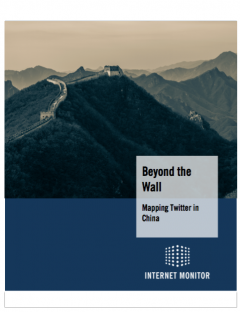
Beyond the Wall
Mapping Twitter in China
"Beyond the Wall: Mapping Twitter in China," authored by Sonya Yan Song, Robert Faris, and John Kelly, is the seventh paper in the Internet Monitor special report series, which focuses on key events and new developments in Internet freedom. The report maps and analyzes the structure and content found on Twitter centered around users in mainland China, offering a rare look at the activity of Chinese Internet users on a platform that is largely unregulated by the state and only reachable through the use of tools that circumvent state-mandated Internet filters:
For Internet users that reside in mainland China, Twitter offers access to news from around the world and a wealth of ideas and perspectives that might otherwise be unavailable there, as well as a platform for building online communities that is not under direct control of the government. This study of Chinese Twitter—to our knowledge the first such study—offers a unique window into the online activities and global connections of Chinese Internet users who actively circumvent content restrictions. Based on a mixed-methods approach, combining social network analysis and a qualitative review of the content and activity of Chinese Twitter, we are able to map and provide detailed accounts of the topically based clusters that form among these networks.
We identify 36 clusters that focus primarily on three areas: politics, technology, and entertainment. From one perspective, the discourse in the politically engaged portions of Chinese Twitter suggests that Twitter serves an alternative public sphere. The political group is formed of journalists, lawyers, human rights activists, and scholars, who are free to discuss topics typically not permitted in China, such as the Tiananmen Square protests, Tibetan and Uyghur issues, political scandals, and pollution. Yet China’s Internet repression is clearly succeeding. Chinese Twitter falls well short of supporting a broadly accessible networked public sphere. The proportion of the Chinese populace with direct access to the debates, communities, and shared resources on Twitter is relatively small, and the avenues by which such discourse might find its way into mainstream political discussion are severely constrained. The firewall between Twitter and the much larger social media platforms in China remains a formidable barrier.
About Internet Monitor
Internet Monitor is a research project based at Harvard University's Berkman Center for Internet & Society. Internet Monitor's aim is to evaluate, describe, and summarize the means, mechanisms, and extent of Internet content controls and Internet activity around the world. The project helps researchers, advocates, policymakers, and user communities understand trends in Internet health and activity through research, analysis, and data visualization.
Internet Monitor is a project of the Berkman Center for Internet & Society. It is funded by the US Department of State and the MacArthur Foundation. For more information about the project, please see the Internet Monitor website.


